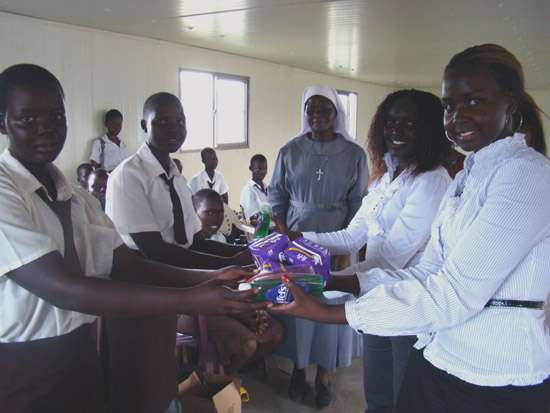ONAMBUTU Combined School in the Ohangwena region is determined to keep girls in school by providing them with sanitary pads and sensitising boys about menstruation.
The Namibian accompanied a United Nations Children’s Fund (Unicef) team to the school, at Eenhana, last month.

Unicef, in collaboration with the ministry of agriculture and the ministry of health, has been piloting a community-led total sanitation (CLTS) programme in some communities.
The team arrived at the school just before break time, and after a short meeting the touring party was taken for a tour of the school.
At break time principal Ester Mbango demonstrated the progress the school has made in different areas, including building toilets, installing water points for pupils to wash hands and, especially, in menstrual hygiene management.
“I can proudly say that after the workshop we received in CLTS by Unicef we have done a lot and have achieved much. This workshop changed a lot of lives, within the school and in the community,” said Mbango.
“In the past, we had problems with girls not coming to school because they are menstruating and have no sanitary pads because either the parents can’t afford pads or because they are orphans,” she said.
She also said that girls would stay away from school for five to six days when they were menstruating, but this has changed.
“Now, with the policy in place, we educate the girls how to take care of themselves and sensitised boys to keep anyone who is on menstruation confidential [sic] in case menstrual blood is seen,” Mbango said.
“The boys will make fun of you, especially when there is blood on your dress. Sometimes you stay away longer because you are too embarrassed to come to school,” she said.
“Now things have changed. When we are on our periods we go to certain teachers who will help us, and we also change our pads three times a day, as it’s part of the menstruation hygiene policy,” Nginaanekwa said.
Simion Kanghameni (17), a member of the menstrual hygiene management club, said that if boys are making fun of girls who are menstruating, they are reported and punished.
“Inasmuch as we are promoting menstrual hygiene, we also encourage learners to wash their hands. Through this we want to create a healthy and clean environment. So every time the pupils come from the toilet, they wash their hands, as well as the girls who changed their pads,” principal Mbango said.
She added that girls are also taught to use a clean cloth if they don’t have sanitary pads, and after using the cloth they must wash it three times a day. Mbango said the school received the pads through a grant provided by government.
Aside from promoting the use of sanitary pads and hand washing, the CLTS programme also looks at motivating communities to stop the practice of open defecation by building toilets at schools and homesteads.

